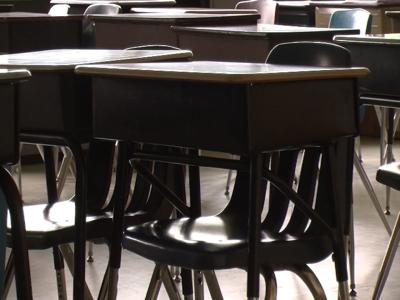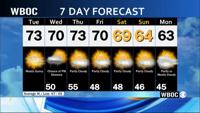Each week a member of the WBOC and WRDE news teams will dig into an aspect of race relations or diversity on Delmarva. These stories will highlight challenges, provide inspiration and hopefully, spark conversation here on the peninsula.
"One of my classmates called me 'blackie' even though they knew it made me uncomfortable," said one student.
"There was a time that one of the white students in our class called a black student 'ghetto.' The teacher did nothing," said another student.
"Heard a lot of 'build a wall' and hate against Mexicans specifically,” said another student.
Stories of hate and racism in schools. They’ve have been around for hundreds of years.
Even as recently as the mid-20th century, African American students were denied the opportunity to attend schools with their Caucasian neighbors and friends.
But then the NAACP challenged segregation laws in public schools, filing lawsuits on behalf of plaintiffs in states like Virginia and Delaware.
Along with the fight for equality came the landmark 1954 Supreme Court case, Brown v. Board of Education, in which the justices ruled unanimously that racial segregation of children in public schools was unconstitutional.
Fast forward to the year 2020. While segregation in public schools is no longer legal, the fight for equality continues, with some saying they feel discrimination today here on Delmarva.
Amanda Eric is a senior at Caesar Rodney High School, who says she has felt unwelcomed in school.
“For me myself an experience I had happened actually a year ago and I was at a class of 2021 meeting. A girl there she was talking to us after the meeting and she said, ‘You guys aren’t like the other black kids. You guys are really proper, you dress nicely, you guys have really nice well-spoken voices.’ I was really appalled because it’s not like blatant racism where someone would say the n-word. It was kind of just like something so subtle but still, it felt very impactful and insensitive to me," Eric recalls.
Several young adults we spoke with described experiencing various forms of racism.
But what exactly does it mean?
Merriam Webster’s dictionary defines racism as "a belief that race is the primary determinant of human traits and inherent superiority of a particular race."
Eric is not alone.
"Black Lives Matter was washed away before anyone could see it. We were just practicing our right to put chalk on the campus as any student has. We would notice that the parties we had in the community, those would get shut down and as everyone was walking out the parties that were predominantly white would be able to continue," said Donovan Mack, a Salisbury University alumnus.
Last year Salisbury police and Salisbury University police investigated racist graffiti found on the SU campus. A man, who was not an SU student, was arrested for the incident. Germain Jackson, who is black, was convicted of the crime and is serving 18 months behind bars.
Prior to Jackson being identified as the suspect and arrested, the incident united the campus and sparked peaceful protests, where students demanded change.
Demographics on theDelaware Department of Education website show a lack ofdiversity in staff and administration in schools across the state.
As of Sept. 30:
- 30% of students in Delaware were African American
- 18.14% were Hispanic
- And 42.70% were white
However in the 2019 school year:
- Only 11% of teachers were African American
- And 3.21% were Hispanic
Diversity and inclusion are something Milford School Board member Rony Baltazar Lopez says he advocates for.
"Representation matters in all aspects of education whether its the teacher...administration...school leaders if we don't have people at the table we don't have a solution," said Baltazar-Lopez.
“We need to understand that it takes all of us to transform education and its a cultural shift,” Erika Gutierrez, theLatino Outreach Coordinator for DelawareCAN advocates for people's rights daily through social media, and believes education is the gateway for change.
"Teachers expect the less from people of color...they don't push them and say, 'I know you can do better, and these are the standards and we are gonna get it done.' So we have to create that political environment that asks for those standards and qualifications for teachers," said Gutierrez.
Similar demographic patterns can be found in Eric’s high school, adding she feels being a person of color comes with fewer privileges than her peers.
"Often advanced classes or classes that are considered more smart or privileged you see a lot of white students. So with that me being in that space I definitely feel like at times I don't feel as welcomed whether asking for help or asking did I get the question right because it just seems like why are you asking all those questions” said Eric.
Thanks to programs like Teensharp, an organization that helps low-income black and Latino students across Delaware prepare for top colleges.
Students, like Eric, are able to find extra guidance and counseling.
"They definitely have helped me, get to the point where I am now when it comes to educational and just even personal growth so with that I learned more about the college process, gotten to sit in meetings with college admission officers never thought I would do that I learned more about how stocks work and how I could invest right now, even though I'm 17. I have a LinkedIn account...I definitely feel like its something that needed to be done," added Eric.
"We need to have an inclusive school environment that provides learning opportunities for all our students that one we have a vigorous opportunity for students so if a student of low income or diverse students who want to take AP classes or honors classes should have the opportunity to take that class and again improve teacher diversity. If your teacher is of diverse background and if your a student, you're more likely to be inspired by that teacher or instill that mindset that if they can do it I can do it and improving AP diversity," said Baltazar-Lopez.
So Delmarva, where do we go from here?
"Well, the most amazing thing that you can do is realize that you’re part of it all," said Guitierrez. "That you are part of our community and what you do and don’t do is defining what is happening to every single one of us. Be loving, be kind, be conscious, and learn about the issue and then use your skills for education and your resources to make an equality change. To bring equity to schools, to parents, institutions. and the boards you are a member of making sure that people of color are there."





